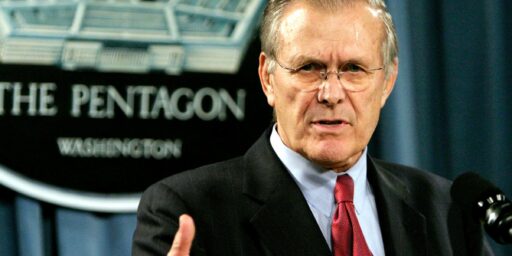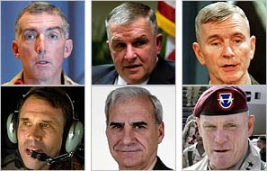Rumsfeld Revisited
Newsweek has an interesting cover story on SECDEF Rumsfeld’s leadership style and its effect on the Iraq prison scandals. It makes two major arguments. First, that Rumsfeld’s abrupt style has made him unpopular with many senior leaders, especially in the Army, and that they were therefore not going out of their way to keep him in the loop on the crisis as it developed. Second, and somewhat related, officers believed that Rumsfeld didn’t like bad news or brook disagreement and therefore people were reluctant to push information about the scandal up to him. These are fair points, although the line between myth and reality is unclear, as even this story points out.
Rumsfeld’s main direct failing in this case is political: he failed to see how serious the situation was early and most importanly, let the president get taken by surprise.
In January came the first reports of the grotesque humiliation of prisoners at Abu Ghraib. A whistle-blower—a soldier with a sense of decency—slid a computer disk with some hair-raising pictures under an investigator’s door. The military publicly announced that it was launching an investigation. With the usual can-do attitude, the report up the chain to the secretary of Defense was situation-under-control. Rumsfeld did not ask to see the pictures.
For a forward-leaning detail man, Rumsfeld was strangely passive. It does not seem to have occurred to him that the photos could be devastating. Last week he protested that he could not very well have reached down into the investigation and asked to see the evidence. Since he might have to rule on the fates of defendants facing courts-martial, Rumsfeld and his aides could not be seen prejudging the case or influencing it in any way. Rumsfeld, who normally mocks lawyers as worrywart bureaucrats and nitpickers, was demonstrating unusual legal fastidiousness. But he was also being true to his disdain for all things Clintonian. He scorned the prior administration for being more concerned about image than action.
This is a difficult one to assess from the outside. I took note of the situation in a post on March 23 and promptly forgot about it. (Quite literally; I rediscovered that post a day into the scandal when it started showing up in my referral logs.) Without the pictures and the graphic descriptions that emerged later, this appeared to be an incredibly minor incident–petty crimes that were being dealt with promptly by the system. That’s not something one would expect–or even want–the SECDEF and JCS Chairman to be involved with early on. It’s now clear that the offenses were far from petty. Still, the propaganda power comes almost entirely from the photographs. While it took criminal action–the leaking of classified material to the press–for them to become public, such a circumstance was forseeable. Someone at the investigative level, certainly at least MG Taguba, should have understood how powerful they were and emphasized the seriousness of the situation through the chain of command.





Which makes me wonder if this was a setup of Rummy be someone in the senior command?
I truly believe that there is a fear at Command of what Rumsfeld will do to the bureaucracy, and a bureaucracy will always feel more powerful than their elected or appointed leader.
If it was a hatchet job, it was brilliant. Downplay the issue to Rumsfeld, then leak pictures that will make him look horrible.
Is it that the pictures have propaganda power — or is it that the pictures aren’t deniable? There were reports of “torture lite” in Gitmo, and some of the British citizens who were released reported very similar abuses there. I have no sympathy for the SecDef given a pattern of abuse.
“Someone at the investigative level, certainly at least MG Taguba, should have understood how powerful they were and emphasized the seriousness of the situation through the chain of command.”
I think this quote hits the proverbial nail on the head for me, vis a vis my concerns re: the Bush administration.
It seems that the upper-echelon has a wall around it (loyalty, non-accountability), and has cut itself off from lower-level information streams. I think this is a serious short-coming of the Bush administration (in military and almost all other areas) — serious enough to give pause to a re-election vote.